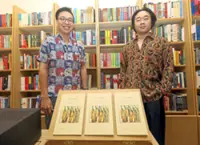Author Malachi Edwin Vethmani’s talents are directed towards building an image with language, arresting images like “I had spoken to the dying moon: He is gone.” Here, he communes with the moon and other spirits, but to what end, one wonders. What’s the payoff?
Death is a constant presence in this collection, which is divided into three sections. The first section starts with an eight-part poem called Mother. In the poem, the speaker moves from his mother’s bedroom, where he watches her “begin her Sunday morning ritual” of dressing up in her Sunday best, to her deathbed, where he wonders if she is hanging on for the sake of her “children / grandchildren / great grandchildren”.




